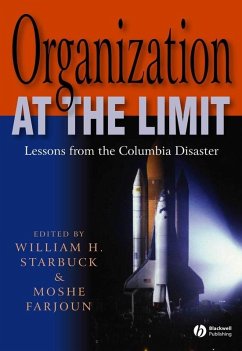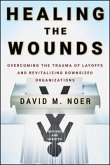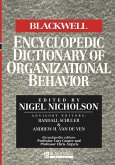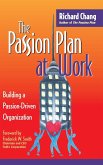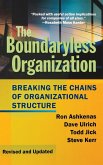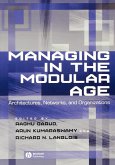H. William Starbuck / Moshe FarjounLessons from the Columbia Disaster
Organization at the Limit
Lessons from the Columbia Disaster
Herausgeber: Starbuck, William; Farjoun, Moshe
H. William Starbuck / Moshe FarjounLessons from the Columbia Disaster
Organization at the Limit
Lessons from the Columbia Disaster
Herausgeber: Starbuck, William; Farjoun, Moshe
- Gebundenes Buch
- Merkliste
- Auf die Merkliste
- Bewerten Bewerten
- Teilen
- Produkt teilen
- Produkterinnerung
- Produkterinnerung
Tragedies like the Columbia disaster are distressing reminders that things can go wrong in large, highly regarded organizations. Although we embrace new technologies eagerly, we are reluctant to accept the risks of innovation. Moreover, some technologies and organizations may be too complex to control effectively. What makes some organizations more prone to accidents? Do the very measures taken to increase safety contribute to accidents? Can societies, organizations, and individuals learn from failures and reduce risks? Against this backdrop, Professors William H. Starbuck of New York…mehr
Andere Kunden interessierten sich auch für
![Healing the Wounds Healing the Wounds]() David M NoerHealing the Wounds24,99 €
David M NoerHealing the Wounds24,99 €![The Blackwell Encyclopedic Dictionary of Organizational Behavior The Blackwell Encyclopedic Dictionary of Organizational Behavior]() The Blackwell Encyclopedic Dictionary of Organizational Behavior72,99 €
The Blackwell Encyclopedic Dictionary of Organizational Behavior72,99 €![The Passion Plan at Work The Passion Plan at Work]() Richard Y ChangThe Passion Plan at Work30,99 €
Richard Y ChangThe Passion Plan at Work30,99 €![The Boundaryless Organization The Boundaryless Organization]() Ron AshkenasThe Boundaryless Organization34,99 €
Ron AshkenasThe Boundaryless Organization34,99 €![The Blackwell Companion to Organizations The Blackwell Companion to Organizations]() Joel A C Baum (ed.)The Blackwell Companion to Organizations247,99 €
Joel A C Baum (ed.)The Blackwell Companion to Organizations247,99 €![Managing in the Modular Age Managing in the Modular Age]() Managing in the Modular Age64,99 €
Managing in the Modular Age64,99 €![The Abilene Paradox and Other Meditations on Management The Abilene Paradox and Other Meditations on Management]() Jerry B HarveyThe Abilene Paradox and Other Meditations on Management26,99 €
Jerry B HarveyThe Abilene Paradox and Other Meditations on Management26,99 €-
-
-
Tragedies like the Columbia disaster are distressing reminders that things can go wrong in large, highly regarded organizations. Although we embrace new technologies eagerly, we are reluctant to accept the risks of innovation. Moreover, some technologies and organizations may be too complex to control effectively. What makes some organizations more prone to accidents? Do the very measures taken to increase safety contribute to accidents? Can societies, organizations, and individuals learn from failures and reduce risks? Against this backdrop, Professors William H. Starbuck of New York University and Moshe Farjoun of York University have invited diverse experts to contribute insights about the Columbia accident and the organizational lessons it suggests. This book thus presents many viewpoints on the complex behavioral factors that led to disaster.
Hinweis: Dieser Artikel kann nur an eine deutsche Lieferadresse ausgeliefert werden.
Hinweis: Dieser Artikel kann nur an eine deutsche Lieferadresse ausgeliefert werden.
Produktdetails
- Produktdetails
- Verlag: Wiley
- Seitenzahl: 416
- Erscheinungstermin: 12. September 2005
- Englisch
- Abmessung: 255mm x 215mm x 36mm
- Gewicht: 885g
- ISBN-13: 9781405131087
- ISBN-10: 140513108X
- Artikelnr.: 21242074
- Herstellerkennzeichnung
- Libri GmbH
- Europaallee 1
- 36244 Bad Hersfeld
- gpsr@libri.de
- Verlag: Wiley
- Seitenzahl: 416
- Erscheinungstermin: 12. September 2005
- Englisch
- Abmessung: 255mm x 215mm x 36mm
- Gewicht: 885g
- ISBN-13: 9781405131087
- ISBN-10: 140513108X
- Artikelnr.: 21242074
- Herstellerkennzeichnung
- Libri GmbH
- Europaallee 1
- 36244 Bad Hersfeld
- gpsr@libri.de
William H. Starbuck is ITT Professor of Creative Management in the Stern School of Business at New York University. He has been the editor of Administrative Science Quarterly and chaired the screening committee for senior Fulbright awards in business management; he was the President of the Academy of Management, and he is a Fellow in the Academy of Management, American Psychological Association, American Psychological Society, British Academy of Management, and Society for Industrial and Organizational Psychology. He has published more than 120 articles on accounting, bargaining, business strategy, computer programming, computer simulation, forecasting, decision-making, human--computer interaction, learning, organizational design, organizational growth and development, perception, scientific methods, and social revolutions. Moshe Farjoun is an associate professor at the Schulich School of Business, York University, Toronto. His research interests lie in the intersection of strategic management and organization. His research has explored market and organizational dynamics, particularly as they pertain to the processes of strategy formulation, implementation and change. His articles have appeared in Strategic Management Journal, Academy of Management Journal, Organization Science, and Academy of Management Review.
Notes on contributors.
Foreword: Sean O'Keefe.
Part I: Introduction.
1 Introduction: Organizational Aspects of the Columbia Disaster: Moshe
Farjoun and William H. Starbuck (New York University).
Part II: The Context of the Disaster.
2 History and Policy in the Space Shuttle Program: Moshe Farjoun (New York
University).
3 System Effects: On Slippery Slopes, Repeating Negative Patterns, and
Learning from Mistake? Diane Vaughan (Boston College).
4 Organizational Learning and Action in the Midst of Safety Drift:
Revisiting the Space Shuttle Program's Recent History: Moshe Farjoun (New
York University).
5 The Space Between in Space Transportation: A Relational Analysis of the
Failure of STS-107: Karlene H. Roberts, Peter M. Madsen, Vinit M. Desai
(University of California - Berkley).
Part III: Influences on decision making.
6 The Opacity of Risk: Language and the Culture of Safety in NASA's Space
Shuttle Program: Willie Ocasio (Northwestern University).
7 Coping with Temporal Uncertainty: When Rigid, Ambitious Deadlines Don't
Make Sense: Sally Blount (New York University), Mary Waller (Tulane
University), and Sophie Leroy (New York University).
8 Attention to Production Schedule and Safety as Determinants of
Risk-Taking in NASA's Decision to Launch the Columbia Shuttle: Angela
Buljan (University of Zagreb) and Zur Shapira (New York University).
Part IV: The Imaging Debate.
9 Making Sense of Blurred Images: Mindful Organizing in Mission STS-107:
Karl Weick (University of Michigan).
10 The Price of Progress: Structurally Induced Inaction: Scott A. Snook and
Jeffrey C. Connor (Harvard University).
11 Data Indeterminacy: One NASA, Two Modes: Raghu Garud and Roger Dunbar
(New York University).
12 The Recovery Window: Organizational Learning Following Ambiguous
Threats: Amy C. Edmondson, Michael A. Roberto, Richard M.J. Bohmer, Erika
M. Ferlins, Laura R. Feldman (Harvard University).
13 Barriers to the Interpretation and Diffusion of Information about
Potential Problems in Organizations: Lessons from the Space Shuttle
Columbia: Frances Milliken, Theresa K. Lant, and Ebony Bridwell-Mitchell
(New York University).
Part V: Beyond Explanation.
14 Systems Approaches to Safety: NASA and the Space Shuttle Disasters:
Nancy Leveson, Joel Cutcher-Gershenfeld, John S. Carroll, Betty Barrett,
Alexander Brown, Nicolas Dulac, Lydia Fraile, and Karen Marais (MIT).
15 Creating Foresight: Lessons for Enhancing Resilience from Columbia:
David Woods (Ohio State).
16 Making NASA More Effective: William H. Starbuck (New York University)
and Johnny Stevenson (NASA).
17 Observations on the Columbia Accident: Henry McDonald (University of
Tennessee).
Part VI: Conclusion.
18 Conclusion: Moshe Farjoun and William H. Starbuck (New York University).
Index
Foreword: Sean O'Keefe.
Part I: Introduction.
1 Introduction: Organizational Aspects of the Columbia Disaster: Moshe
Farjoun and William H. Starbuck (New York University).
Part II: The Context of the Disaster.
2 History and Policy in the Space Shuttle Program: Moshe Farjoun (New York
University).
3 System Effects: On Slippery Slopes, Repeating Negative Patterns, and
Learning from Mistake? Diane Vaughan (Boston College).
4 Organizational Learning and Action in the Midst of Safety Drift:
Revisiting the Space Shuttle Program's Recent History: Moshe Farjoun (New
York University).
5 The Space Between in Space Transportation: A Relational Analysis of the
Failure of STS-107: Karlene H. Roberts, Peter M. Madsen, Vinit M. Desai
(University of California - Berkley).
Part III: Influences on decision making.
6 The Opacity of Risk: Language and the Culture of Safety in NASA's Space
Shuttle Program: Willie Ocasio (Northwestern University).
7 Coping with Temporal Uncertainty: When Rigid, Ambitious Deadlines Don't
Make Sense: Sally Blount (New York University), Mary Waller (Tulane
University), and Sophie Leroy (New York University).
8 Attention to Production Schedule and Safety as Determinants of
Risk-Taking in NASA's Decision to Launch the Columbia Shuttle: Angela
Buljan (University of Zagreb) and Zur Shapira (New York University).
Part IV: The Imaging Debate.
9 Making Sense of Blurred Images: Mindful Organizing in Mission STS-107:
Karl Weick (University of Michigan).
10 The Price of Progress: Structurally Induced Inaction: Scott A. Snook and
Jeffrey C. Connor (Harvard University).
11 Data Indeterminacy: One NASA, Two Modes: Raghu Garud and Roger Dunbar
(New York University).
12 The Recovery Window: Organizational Learning Following Ambiguous
Threats: Amy C. Edmondson, Michael A. Roberto, Richard M.J. Bohmer, Erika
M. Ferlins, Laura R. Feldman (Harvard University).
13 Barriers to the Interpretation and Diffusion of Information about
Potential Problems in Organizations: Lessons from the Space Shuttle
Columbia: Frances Milliken, Theresa K. Lant, and Ebony Bridwell-Mitchell
(New York University).
Part V: Beyond Explanation.
14 Systems Approaches to Safety: NASA and the Space Shuttle Disasters:
Nancy Leveson, Joel Cutcher-Gershenfeld, John S. Carroll, Betty Barrett,
Alexander Brown, Nicolas Dulac, Lydia Fraile, and Karen Marais (MIT).
15 Creating Foresight: Lessons for Enhancing Resilience from Columbia:
David Woods (Ohio State).
16 Making NASA More Effective: William H. Starbuck (New York University)
and Johnny Stevenson (NASA).
17 Observations on the Columbia Accident: Henry McDonald (University of
Tennessee).
Part VI: Conclusion.
18 Conclusion: Moshe Farjoun and William H. Starbuck (New York University).
Index
Notes on contributors.
Foreword: Sean O'Keefe.
Part I: Introduction.
1 Introduction: Organizational Aspects of the Columbia Disaster: Moshe
Farjoun and William H. Starbuck (New York University).
Part II: The Context of the Disaster.
2 History and Policy in the Space Shuttle Program: Moshe Farjoun (New York
University).
3 System Effects: On Slippery Slopes, Repeating Negative Patterns, and
Learning from Mistake? Diane Vaughan (Boston College).
4 Organizational Learning and Action in the Midst of Safety Drift:
Revisiting the Space Shuttle Program's Recent History: Moshe Farjoun (New
York University).
5 The Space Between in Space Transportation: A Relational Analysis of the
Failure of STS-107: Karlene H. Roberts, Peter M. Madsen, Vinit M. Desai
(University of California - Berkley).
Part III: Influences on decision making.
6 The Opacity of Risk: Language and the Culture of Safety in NASA's Space
Shuttle Program: Willie Ocasio (Northwestern University).
7 Coping with Temporal Uncertainty: When Rigid, Ambitious Deadlines Don't
Make Sense: Sally Blount (New York University), Mary Waller (Tulane
University), and Sophie Leroy (New York University).
8 Attention to Production Schedule and Safety as Determinants of
Risk-Taking in NASA's Decision to Launch the Columbia Shuttle: Angela
Buljan (University of Zagreb) and Zur Shapira (New York University).
Part IV: The Imaging Debate.
9 Making Sense of Blurred Images: Mindful Organizing in Mission STS-107:
Karl Weick (University of Michigan).
10 The Price of Progress: Structurally Induced Inaction: Scott A. Snook and
Jeffrey C. Connor (Harvard University).
11 Data Indeterminacy: One NASA, Two Modes: Raghu Garud and Roger Dunbar
(New York University).
12 The Recovery Window: Organizational Learning Following Ambiguous
Threats: Amy C. Edmondson, Michael A. Roberto, Richard M.J. Bohmer, Erika
M. Ferlins, Laura R. Feldman (Harvard University).
13 Barriers to the Interpretation and Diffusion of Information about
Potential Problems in Organizations: Lessons from the Space Shuttle
Columbia: Frances Milliken, Theresa K. Lant, and Ebony Bridwell-Mitchell
(New York University).
Part V: Beyond Explanation.
14 Systems Approaches to Safety: NASA and the Space Shuttle Disasters:
Nancy Leveson, Joel Cutcher-Gershenfeld, John S. Carroll, Betty Barrett,
Alexander Brown, Nicolas Dulac, Lydia Fraile, and Karen Marais (MIT).
15 Creating Foresight: Lessons for Enhancing Resilience from Columbia:
David Woods (Ohio State).
16 Making NASA More Effective: William H. Starbuck (New York University)
and Johnny Stevenson (NASA).
17 Observations on the Columbia Accident: Henry McDonald (University of
Tennessee).
Part VI: Conclusion.
18 Conclusion: Moshe Farjoun and William H. Starbuck (New York University).
Index
Foreword: Sean O'Keefe.
Part I: Introduction.
1 Introduction: Organizational Aspects of the Columbia Disaster: Moshe
Farjoun and William H. Starbuck (New York University).
Part II: The Context of the Disaster.
2 History and Policy in the Space Shuttle Program: Moshe Farjoun (New York
University).
3 System Effects: On Slippery Slopes, Repeating Negative Patterns, and
Learning from Mistake? Diane Vaughan (Boston College).
4 Organizational Learning and Action in the Midst of Safety Drift:
Revisiting the Space Shuttle Program's Recent History: Moshe Farjoun (New
York University).
5 The Space Between in Space Transportation: A Relational Analysis of the
Failure of STS-107: Karlene H. Roberts, Peter M. Madsen, Vinit M. Desai
(University of California - Berkley).
Part III: Influences on decision making.
6 The Opacity of Risk: Language and the Culture of Safety in NASA's Space
Shuttle Program: Willie Ocasio (Northwestern University).
7 Coping with Temporal Uncertainty: When Rigid, Ambitious Deadlines Don't
Make Sense: Sally Blount (New York University), Mary Waller (Tulane
University), and Sophie Leroy (New York University).
8 Attention to Production Schedule and Safety as Determinants of
Risk-Taking in NASA's Decision to Launch the Columbia Shuttle: Angela
Buljan (University of Zagreb) and Zur Shapira (New York University).
Part IV: The Imaging Debate.
9 Making Sense of Blurred Images: Mindful Organizing in Mission STS-107:
Karl Weick (University of Michigan).
10 The Price of Progress: Structurally Induced Inaction: Scott A. Snook and
Jeffrey C. Connor (Harvard University).
11 Data Indeterminacy: One NASA, Two Modes: Raghu Garud and Roger Dunbar
(New York University).
12 The Recovery Window: Organizational Learning Following Ambiguous
Threats: Amy C. Edmondson, Michael A. Roberto, Richard M.J. Bohmer, Erika
M. Ferlins, Laura R. Feldman (Harvard University).
13 Barriers to the Interpretation and Diffusion of Information about
Potential Problems in Organizations: Lessons from the Space Shuttle
Columbia: Frances Milliken, Theresa K. Lant, and Ebony Bridwell-Mitchell
(New York University).
Part V: Beyond Explanation.
14 Systems Approaches to Safety: NASA and the Space Shuttle Disasters:
Nancy Leveson, Joel Cutcher-Gershenfeld, John S. Carroll, Betty Barrett,
Alexander Brown, Nicolas Dulac, Lydia Fraile, and Karen Marais (MIT).
15 Creating Foresight: Lessons for Enhancing Resilience from Columbia:
David Woods (Ohio State).
16 Making NASA More Effective: William H. Starbuck (New York University)
and Johnny Stevenson (NASA).
17 Observations on the Columbia Accident: Henry McDonald (University of
Tennessee).
Part VI: Conclusion.
18 Conclusion: Moshe Farjoun and William H. Starbuck (New York University).
Index

